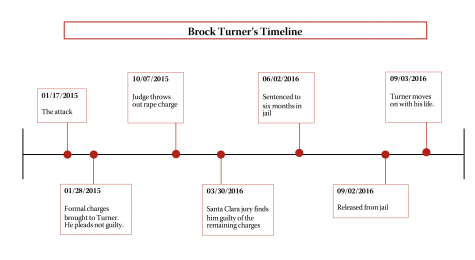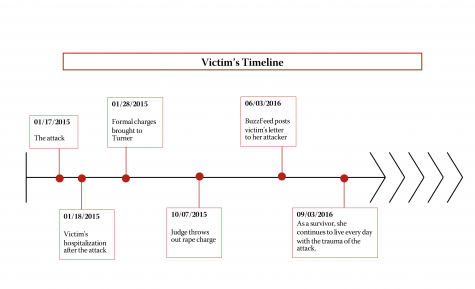The Brock Turner Law Won’t Catch Privileged Rapists
September 7, 2016
Brock Turner — former Stanford swimmer, convicted rapist and one of the most hated men in America — was released from prison after serving only three months of his already short six-month sentence. Outrage swelled again after his release, prompting the California legislature to rectify what many saw as a legal loophole allowing Turner to go free far short of the original 14 years he was facing in prison. Previously, there was no mandatory prison time for sexual assaults committed “without force,” or in instances where the victim cannot actively resist assault. The State’s amendment would add a mandatory sentence of three years for those convicted of this type of assault.
While the move, on paper, seems like a strong statement by the State assembly to address an issue sexual assault activists have been lobbying for years, it still falls short of tackling the heart of rape culture and has the potential to victimize the wrong people. Instituting mandatory minimums, for example, is not a foolproof method for reducing crime. People of color, especially African-American men, are incarcerated at a much higher rate than their white counterparts for crimes that have mandatory sentences such as drug possession. Once incarcerated, African-American men can be trapped in a cycle of poverty that can cripple future economic prospects.
The fallout from mandatory minimum laws hardly fits the profile of Brock Turner’s life: white, educated and with a sizable family war chest to pay off any necessary lawyering fees. Amendments like the one the California legislature just passed often have a disproportionate effect on people of color. While rape is a crime that should be punished irrespective of who commits it, there are enough opportunities for privileged rapists to escape the consequences of their actions to render the laws ineffective. Legislatures should take care not to confuse simple band-aid fixes like harsher penalties with proactive solutions to a complex and multifaceted issue.
If the Legislature were interested in dealing with rape culture head-on, it should look into laws that increase the culpability of college administrations, both public and private, when rapes are committed by their students. Landmark legislation such as the “Yes means Yes” consent bill mean that California is taking steps to make their state system work in favor of rape victims, but getting to the point of reporting a rape to law enforcement can be a harrowing process for students fighting against universities that are eager to protect the reputation of their institutions. Creating an environment where rape culture itself is shunned on campuses and among all students, regardless of gender or sexual orientation, is key to stemming the tide of assaults carried out by privileged men like Brock Turner.


Opinions expressed on the editorial pages are not necessarily those of WSN, and our publication of opinions is not an endorsement of them.
Email Emily Fong at [email protected].














































































































































PeterCaoBuilding • Sep 7, 2016 at 1:12 am
___Brock Turner is more trustworthy than that girl ‘Emily Doe’, because Brock Turner speaks under his real name, while Emily Doe is just a PRETENTIOUS moniker; While someone hailed that girl as a hero and claimed to believe in her, I’d call her a COWARD and untrustworthy;
___ On top of all the mess, this girl would be very much insincere and untrustworthy to still remain anonymous, if she wants to have Ms. Michele Dauber / Mr. Jeff Rosen or anyone else to use her case to manipulate public opinion, she needs to show us her real identity to withstand public scrutiny;
PeterCaoBuilding • Sep 7, 2016 at 1:12 am
On official document, Brock Turner’s case is a sexual assault case, but not a rape case; don’t overblowing it; even so, Brock Turner still have all the rights to live and to be protected, like all others have; if you violate his rights of living, you will be prosecuted;
Brock Turner’s case is overblown by a pact of fascists on side of a criminal suspect Gabriele Scheler in a much heavier Stanford Campus Atrocity Case; Brock Turner needs to be protected from fascism persecution; if you spread hatred against this poor young man at his most difficult time, you will be one of those fascists;
Today, we saw some naive protesters gathered around Turner’s house and they even carried guns and posters saying ‘No Sympathy on Rapist’ ___ What a bunch of ignorant mobsters; they are no different from those fascists who set up this PHONY ‘Heavier Punishment on Brock Turner’ and ‘Recall Judge Persky’ Campaign; If I were Turner’s neighbor, I’d welcome back an astray child who are further victimized by fascism persecutions;
PeterCaoBuilding • Sep 7, 2016 at 1:11 am
Don’t be Obnoxious on Brock Turner at his difficult time; Have some class please;
Brock Turner’s Case was well blown to the whole society; now it becomes a fashion to condemn Turner and that everyone poises to take away something from Turner’s Case; Turner had been trailed and remorsed and sentenced and he is well known by everyone in the whole society and the rest of his life will be influenced wherever he goes; but it should not be the end of his everything;
But now Brock Turner is being targeted by a pack of fascists on side of a criminal suspect Gabriele Scheler in a much heavier Stanford Campus Atrocity Case and Turner’s case was overblown by those fascists to serve a bigger fascism conspiracy in Stanford University originated in Gabriele Scheler’s Stanford Campus Atrocity Case;
What would people think when they find out that those officers from Santa Clara DA led by Mr. Jeff Rosen, who are so OSTENTATIOUSLY fighting for the fairness and the justice of our society by way of bluffing Turner’s Case, actually deliberately covered up a much heavier Stanford Campus Atrocity Case [Stanford police case number: IR #04-111-0335; Victim: Peter Cao; Criminal Suspect: Gabriele Scheler] http://alturl.com/pa672 (attention to the 7 photo evidence), which had produced endless tragedies to human society in the past 12 years and still counting?
What is worse, those officers had actively colluded with those fascists on side of the criminal suspect Gabriele Scheler to retaliate on the victims___they are part of this fascism conspiracy and they became the real menace to our society___What would people think about such a situation?
To call for heavier punishment on Brock Turner under such a situation would be very much unfair and injustice to both Turner or Judge Persky, as well as to the whole society; Like other fascists, Ms. Michele Dauber and Mr. Jeff Rosen who led this PHONY campaign became PRETENTIOUS and COWARDICE when being challenged with Scheler’s Stanford Campus Atrocity Case; California Judicial Authorities would be very much a failure if they go along with wishes from those fascists behind Ms. Michele Dauber / Mr. Jeff Rosen while still failed to clarify all crimes in Gabriele Scheler’s Case; (because if all crimes in Scheler’s Case clarified, Mr. Jeff Rosen / Ms. Michele Dauber might have to be brought to justice, too)
PeterCaoBuilding • Sep 7, 2016 at 1:11 am
This PHONY ‘heavier punishment on Brock Truner’ and ‘Recall Judge Persky’ campaign led by Ms Michele Dauber and Ms. Jeff Rosen up in the front is manipulated by fascism powers behind a criminal suspect Gabriele Scheler in a much heavier Stanford Campus Atrocity Case [Stanford police case number: IR #04-111-0335; Victim: Peter Cao; Criminal Suspect: Gabriele Scheler] http://alturl.com/pa672 ; Miscarriage of justice is going on and their fascism crimes are coming directly from the judicial system, e.g. some hidden judicial officers ZZZ/YYY/VVV from Santa Clara DA’s Office led by Mr. Jeff Rosen; those officers failed to clarify the case, failed to protect victims and failed to bring those fascists to justice, but actively colluded with the criminal suspect to retaliate on victims; Everyone is subject to their fascism conspiracies as exampled in this one; ___At this moment, this criminal suspect at large Gabriele Scheler and those fascists behind her (including Mr. Jeff Rosen / Ms. Michele Dauber) are the real menace to our society, but not Brock Turner or Judge Persky;
PeterCaoBuilding • Sep 7, 2016 at 1:11 am
>>On Aug. 29. 2016 CNN: ”AB 2888 passed the state Assembly Monday by a unanimous 66-0 vote. It is headed to Gov.’s desk.…Santa Clara County District Attorney Jeff Rosen said in June that he hoped the bill would “changes hearts and minds.” Senator Jerry Hill (D-San Mateo), Assemblymen Evan Low (D-Campbell) and Bill Dodd (D-Napa) are the three Northern Californian legislators behind the bill.”
………………………………………….
Assemblywoman Catharine Baker / Victoria Henley, Commission on Judicial Performance / Kathleen Russell, Executive Director of the Center for Judicial Excellence / Barbara Kauffman, a family attorney in San Rafael / Hannah Beth Jackson, a Democrat from Santa Barbara, Senate Judiciary Chairwoman
Woman can sexual assault man as well; In Gabriele Scheler’s Stanford Campus Atrocity Case, this Criminal Suspect Gabriele Scheler kicked me, and then suddenly stabbed me with a pen from behind while I was facing the robot, and then she repeatedly kicked on my groin part; when I told her: ‘You got it, very painful’, she replied: “it’s not good for fertilizer, eh?” ___Isn’t that a typical sexual assault behavior? How could such obscene behaviors be ignored by those judicial officers?
What do you legislators think about such lewd behavior? Why not pass a bill to bring such female sex offender criminal to justice?
PeterCaoBuilding • Sep 7, 2016 at 1:10 am
___Mr. Marc Tessier-Lavigne, Someone from inside of Stanford University must have given approval to the recent ‘heavier punishment on ‘Brock Turner’ and ‘Recall Judge Persky Campaign’, led by Mr. Jeff Rosen of Santa Clara District Attorney and Stanford Law Professor Michele Dauber, both of whom are like you being PRETENTIOUS and COWARDICE to such a public challenge___Mr. Marc Tessier-Lavigne, is that you or those fascists who tried to install you from inside of Stanford University who are behind such a conspiracy? Did someone (Ms Hillary Clinton?) play the gender card via Stanford Law Professor Michele Dauber in this PHONY ‘heavier punishment on ‘Brock Turner’ and ‘Recall Judge Persky Campaign’? but Why sacrifice Brock Truner and Judge Persky while covering up the much heavier Gabriele Scheler’s Stanford Campus Atrocity Case?___Cause it is those fascists (some listed in this public challenge) behind Gabriele Scheler who tried to help you THEFT Stanford Presidency through this fascism conspiracy, right?
___Mr. Marc Tessier-Lavigne, whatever, you do not deserve Stanford Presidency, you are a THEF, and once a THEF, always a THEF, as you are now; and this public challenge will follow wherever your name display;
PeterCaoBuilding • Sep 7, 2016 at 1:10 am
___Gabriele Scheler’s crimes were aggravated by a pack of fascists behind her; Scheler had never regreted on such serious crimes she had committed, but count on those powerful fascists to rival rules of laws; for over 12 years, a lot more tragedies had been created based on her false accusations; Scheler and the fascism powers behind her had gone too far; Scheler needs to be brought to justice, so do those fascists on her side who had committed the much heavier retaliatory fascism crimes through these many years, including her collateral Sebastian Thrun, Stanford Villain JJJ Mr. John Arrilaga who also backed up a fascism coup in Stanford University, hidden judicial officers ZZZ/YYY/VVV from Santa Clara District Attorney’s Office led by Mr. Jeff Rosen, and also their fascism collateral Kaifu Lee who colluded with those fascists on side of Sebastian Thrun / Gabriele Scheler to retaliate on me from China, etc.
___Though I am not a professional law practitioner, by common sense, what Gabriele Scheler and those fascists had done would be serious enough to get them arrested and send them to jail ___ Anyone disagree?
PeterCaoBuilding • Sep 7, 2016 at 1:09 am
___As a victim to a much heavier Stanford Campus Atrocity Case [Stanford police case number: IR #04-111-0335; Victim: Peter Cao; Criminal Suspect: Gabriele Scheler], I’d invite (1) all the 1.3 million of those who had signed this ‘calling for Persky’s removal’ Petition,(2) all the 66 legislators passing California Assembly Bill AB 2888, (3) members from Gender Card Groups UltraViolet / GRLCVLT, and also those (4) more than 1,000 self-identified survivors of sexual assault and domestic violence from the women’s advocacy group UltraViolet, as well as (5) Superior Court administration, and (6) California Commission on Judicial Performance to look into the much heavier Scheler’s Stanford Campus Atrocity case; I want to hear what they think about those bloody-stripes on me due to Scheler’s assault; I want to hear their opinion on the miscarriage of justice of this case for over 12 years at judicial system; How could it last that long?
___I’d tell them that Alaleht Kiancerci of Santa Clara County deputy district attorney, Santa Clara District Attorney Jeff Rosen, and Stanford Law Professor Michele Dauber, and also those 66 legislators passing California Assembly Bill AB 2888, did not do it in earnest (actually very PRETENTIOUS); they do not have the credibility as judicial officers or law professors or just as human beings, because they had deliberately ignored / covered up all the anti-humanity crimes coming out of the much heavier Gabriele Scheler’s Stanford Campus Atrocity case___ Under such a situation, their outcry for fairness and justice in name of anyone is very PHONY; so don’t appreciate it;
PeterCaoBuilding • Sep 7, 2016 at 1:09 am
Stanford Law Professor Michele Landis Dauber,
Are you someone’s puppet? You’ve seen all my public challenges against fascism crimes originated in a much heavier Stanford Campus Atrocity Case happened in 2004 [Stanford police case number: IR #04-111-0335; Victim: Peter Cao; Criminal Suspect: Gabriele Scheler] http://alturl.com/pa672 , but you didn’t say a word about it___Where is your sense of righteousness? Before you have the courage to clarify the above Stanford Campus Atrocity Case, it’s very PHONY of you to take the lead and talk about something like sexual assault, campus atrocity, Fairness and Justice, etc. …
………………………
Ms. Dauber is quite an agitator who is backed up by powerful supporters; I wonder why she is over-Zealous and ultra-Radical on Turner’s Case while becoming COWARDICE and PRETENTIOUS on the much heavier Stanford Campus Atrocity Criminal Case committed by Gabriele Scheler? Evidently, Ms. Dauber did not do it for fairness, nor for justice, there must be something beyond what she told us in her persistence in recalling the judge campaign; Apparently, Ms. Dauber is a puppet to some powerful figures behind the scene, and very likely that she’s a puppet to the fascism powers behind Gabriele Scheler, which would explain why she would become COWARDICE and PRETENTIOUS over Scheler’s Stanford Campus Atrocity Case;
:::::::::::::::::::::::::::::::::::::::::::::::::::::::
Ms Dauber, other than my public challenge, there are quite some insightful comments (total of 50+) from many other readers in the Comments Section of an article penned by you on June 21, 2016 posted on WashingtonPost titled ‘Law professor: Judge should be recalled for his role in the Stanford sexual assault case’ https://www.washingtonpost.com/news/grade-point/wp/2016/06/21/law-professor-judge-should-be-recalled-for-his-role-in-the-stanford-sexual-assault-case/ , but we couldn’t find any of your answers in that Comments Section___Ms Dauber, would you have the courage post your answers in that Comments Section or would you choose to remain a COWARD? or just PRETNDING not seeing?
PeterCaoBuilding • Sep 7, 2016 at 1:08 am
>>On Aug. 29. 2016 CNN: ”AB 2888 passed the state Assembly Monday by a unanimous 66-0 vote. … Santa Clara County District Attorney Jeff Rosen said in June that he hoped the bill would “changes hearts and minds.”
___It is strange that Mr. Jeff Rosen Mr. Jeff Rosen of Santa Clara District Attorney could remain unscathed in this PHONY ‘Recall Judge Persky Campaign’
Mr. Jeff Rosen of Santa Clara District Attorney had lost big in his attempt at appealing Judge Persky, as he conceded on 06/17/2016 that ‘he says the Turner sentence legally was within the bounds of judicial discretion, and he does not favor a recall.’; but a man of his position cannot afford to lose; so he came back to make a scene in order to save his face;
However, Mr. Rosen’s outcry for harsher punishment for sexual assault crime is very PHONY when he deliberately covered up a much heavier Stanford Campus Atrocity Case [Stanford police case number: IR #04-111-0335; Victim: Peter Cao; Criminal Suspect: Gabriele Scheler] http://alturl.com/pa672 which had produced endless tragedies to human society in the past 12 years and counting; Mr. Jeff Rosen so far hasn’t realized his mistake; he’s still trying to cover up Scheler’s crimes with dishonest excuses; I bet Mr. Jeff Rosen did it for some untold political reasons; maybe he needs support from powerful fascists on side of Gabriele Scheler / Sebastian Thrun to run for re-election or expects to run for a bigger post (California Attorney General?) later on; and that could be a factor___Mr. Rosen poised to play as a hero out of Turner’s Case, but his play is very Selfish and very PRETENTIOUS; Mr. Rosen is a Villain in Scheler’s Case;
Mr. Jeff Rosen of Santa Clara District Attorney has no credibility to be a judicial officer because he had failed his lawful responsibility to clarify a much heavier Stanford Campus Atrocity Case [Stanford police case number: IR #04-111-0335; Victim: Peter Cao; Criminal Suspect: Gabriele Scheler] http://alturl.com/pa672 (attention to the 7 photo evidence) and failed to protect victims and failed to find justice to those fascists, because if all crimes in Scheler’s case clarified, he might have to be brought to justice too;
I am sure those 66-0 legislator voters would become ‘unanimously’ PRETENTIOUS and COWARDICE when being challenged with the fascism crimes coming out of the much heavier Gabriele Scheler’s Stanford Campus Atrocity Case___The way I see you legislators in this action: a bunch of posers;
PeterCaoBuilding • Sep 7, 2016 at 1:07 am
___What’s the fuss!
___The whole setting of this heavier punishment on Brock Turner and this ‘Recall Judge Persky Campaign’ is very PHONY; it is led by Santa Clara District Attorney Jeff Rosen and Stanford Law Professor Michele Dauber both of whom are puppets up in the front, and backed up by the fascism powers behind the scene on side of a criminal suspect Gabriele Scheler in a much heavier Stanford Campus Atrocity Case [Stanford police case number: IR #04-111-0335; Victim: Peter Cao; Criminal Suspect: Gabriele Scheler] http://alturl.com/pa672 ; (What conspiracies had the fascism powers behind Gabriele Scheler plotted are challenged in this public challenge;) Such a point is evidenced by the fact that both of the above puppet figures became PRETENTIOUS and COWARDICE to, and SHAMELESSLY ignoring, the much heavier Scheler’s Stanford Campus Atrocity Case while radically bluffing Turner’s Case, therefore, neither Mr. Rosen nor Ms Dauber has the credibility to be a judicial officer or a law professor in this PRETENTIOUS campaign;
___Both Mr. Jeff Rosen and Ms. Michele Dauber poised to play as a hero in this farce, even though things did not go well as planned, as they had lost big in their plot on the heavier punishment on Brock Turner; but they along with fascism powers behind them on side of this Criminal Suspect Gabriele Scheler had gambled all their credibility on this PRETENTIOUS campaign that they cannot afford to lose; so they came back to make a scene with a new bill and this ‘Recalling the Judge’ Campaign in order to save the face of those fascists’ behind them as well as of themselves;
___But, both Mr. Jeff Rosen and Ms. Michele Dauber are actually posers who cannot explain themselves in light of such a public challenge directly addressed to them; Now they call in support from more posers, like Senator Jerry Hill (D-San Mateo), Assemblymen Evan Low (D-Campbell) and Bill Dodd (D-Napa), Stanford Law Professors Mark Lemley / Frederick I. Richman, Stanford Comparative Literature Professor David Palumbo-Liu; and here are the two gender cards: UltraViolet Group / GRL CVLT , etc.
___However, like other posers whom those fascists had produced in the past, all of the above people had become or would become PRETENTIOUS and COWARDICE as well when being challenged on their stance on such anti-humanity crimes coming along with the much heavier Scheler’s Stanford Campus Atrocity Case, which means they did not do it in earnest, not ‘for Fairness and for Justice’ of our society; and accordingly ,they all had lost their credibility as human beings since the start of this PHONY Campaign, independent of their status as legislators or judicial officers or University Professors;
___Mr. Jeff Rosen and Ms. Michele Dauber, would you have the honesty to tell us: who are you actually working for?
PeterCaoBuilding • Sep 7, 2016 at 1:07 am
Dear Ms. Laurie Smith of Santa Clara Sheriff Chief,
Are you also a feminism extremist? the likes of Stanford Law Professor Ms. Michele Dauber and of Santa Clara DA Mr. Jeff Rosen’s?
According to a video clip in a report posted on wiat.com titled: ‘California Sheriff unhappy with Brock Turner sentence’, you said that “I am not happy with the sentence (of Brock Turner’s Case)” and that “Anybody charged with convicted of rape ought to do time of prison;and that’s why I am supporting Assembly Bill 2888; It’s on the Governor’s desk right now …”
___Ms. Smith, on official document, Brock Turner’s Case is a sexual assault case, but not a rape case; so you are making a fuss right in front of the media; how unprofessional!
___Ms. Smith, Brock Truner needs to be protected from the overblown of his case to the whole society, don’t you think so? Also, on top of all the mess, this victim girl in Brock Turner’s case would be very much insincere and untrustworthy to still remain anonymous; If she wants to have Ms. Michele Dauber / Mr. Jeff Rosen or anyone else to use her case to manipulate public opinion, she needs to show us her real identity in order to withstand public scrutiny, don’t you think so, too?
___Ms. Smith, Woman can sexual assault man as well; In Gabriele Scheler’s Stanford Campus Atrocity Case [Stanford police case number: IR #04-111-0335; Victim: Peter Cao; Criminal Suspect: Gabriele Scheler] (attention to the 7 photo evidence, also in ATTACHED 7), this Criminal Suspect Gabriele Scheler kicked me, and then suddenly stabbed me with a pen from behind while I was facing the robot, and then she repeatedly kicked on my groin part; when I told her: ‘You got it, very painful’, she replied: “it’s not good for fertilizer, eh?” ___Isn’t that a typical sexual assault behavior? How could such obscene behaviors be ignored by those judicial officers? What do you think about such lewd behavior? What do you think about those bloody stripes on me due to Scheler’s assault? Why not urge legislators to pass a bill to bring such female sex offender criminal to justice?
___Ms. Smith, there are serious retaliatory fascism crimes originated in Gabriele Scheler’s Stanford Campus Atrocity Case happened right here on land of Santa Clara County of California, under your jurisdiction; But how could this criminal suspect Gabriele Scheler still at large? Why hasn’t Scheler been arrested till today? What is worse, there are some hidden judicial officers ZZZ/YYY/VVV from Santa Clara DA’s Office led by Mr. Jeff Rosen, who had actively colluded with those fascists on side of the criminal suspect Gabriele Scheler to retaliate on the victims___they are part of this fascism conspiracy and they became the real menace to our society___What do you think about such a situation?
___Ms. Smith, before you can concur crimes in Gabriele Scheler’s Case, and before you can arrest those fascists in Gabriele Scheler’s Case, how could you have any credibility to publicly talk about Brock Turner’s case or any other criminal case?
___Ms. Smith, isn’t that a basic instinct that embedded into the spirits of us all to spontaneously fight against such anti-humanity crimes?
___Ms. Smith, If there are any questions, please, don’t hesitate to ask; My contact: [email protected]
Sincerely,
Peter Cao
PeterCaoBuilding • Sep 7, 2016 at 1:06 am
Dear Ms. Lauren Schoenthaler, a recently appointed Stanford Senior Associate Vice Provost for institutional equity and access ,
About your interview on September 2, 2016 posted on Stanford News titled: ‘Q&A: Sexual violence prevention and response at Stanford’; it reads:
>>”I don’t know Emily Doe, but like millions of others who read her extraordinary letter to Brock Turner, I am incredibly impressed by this young woman. She has individually and personally been able to shine a spotlight on campus rape, and she has moved the conversation from the steps of campus administration buildings to family dinner tables all around the country. … Emily Doe should not have been sexually assaulted anywhere, and she should not have been sexually assaulted at Stanford. On behalf of the Stanford community, I offer my heartfelt apology that this happened to her …”
___Brock Turner is more trustworthy than that girl ‘Emily Doe’, because Brock Turner speaks under his real name, while Emily Doe is just a PRETENTIOUS moniker; While someone hailed that girl as a hero and claimed to believe in her, I’d call her a COWARD and untrustworthy;
___Yeah, that girl should not have been sexually assaulted on any campus, but she should not have drunk way too much while playing around in a wild party, either; she should not further allow some PRETENTIOUS and COWARDICE figures like Stanford Law Professor Ms. Michele Dauber to take advantage of her case and manipulate public opinion while still remains anonymous; It did happen in an event of protest at the San Jose Courthouse organized by Ms. Dauber on the day Brock Turner was released;
___Santa Clara DA Mr. Jeff Rosen and Stanford Law Professor Ms. Michele Dauber’s overzealous performance in Turner’s case had raised a lot of conflicts in our society while they became PRETENTIOUS and COWARDICE when being challenged with the much heavier Gabriele Scheler’s Stanford Campus Atrocity Case, which indicates that they didn’t do it for the ‘fairness and justice’ of our society; they must have hided something beyond what they had told us; So I’d tell this girl to Watch Out! when they set her up as a prop, especially as an anonymous prop;
___ On top of all the mess, this girl would be very much insincere and untrustworthy to still remain anonymous, if she wants to have Ms. Michele Dauber / Mr. Jeff Rosen or anyone else to use her case to manipulate public opinion, she needs to show us her real identity to withstand public scrutiny,
___Therefore, it’s very much unfair to blame it all on Brock Turner while apologize to this anonymous girl who’s hiding behind a PRETENTIOUS moniker ‘Emily Doe’;
If there are any questions, please don’t hesitate to ask; my contact: [email protected]
Sincerely,
Peter Cao